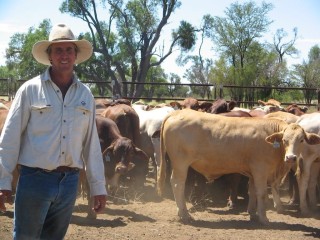 When you handle tens of thousands of cattle from hundreds of different suppliers every year, tag retention is an important issue.
When you handle tens of thousands of cattle from hundreds of different suppliers every year, tag retention is an important issue.
Augathella cattle producer Peter Elmes is the western livestock manager for large scale cattle operation Allied Beef, which at any given time has tens of thousands of cattle placed on properties throughout Queensland and New South Wales.
The company forms partnerships with property owners that allow both to share in the benefits of economies of scale and highly-targeted feeding and marketing programs for premium markets.
In his role as western livestock manager for Allied Beef Mr Elmes manages the physical movements of hundreds of different groups of cattle sourced from a wide range of suppliers every year.
As a result he also sees a large range of NLIS tags coming through on the animals he handles, and gets a first-hand impression of which tags work in practice and which tags don’t.
Tags that don’t stay in amount to a major headache, not just in the cost of reapplying tags but in the lost time required to physically replace them, particularly when entire trucks have to be unloaded so animals with missing tags can have new ones applied.
Reflecting the cost involved, some saleyards and feedlots now impose fees of up to $25 per head for every animal that arrives without a tag.
The loss of lifetime traceability was a further cost, Mr Elmes said.
“Even when you replace that tag, they have already lost their lifetime traceability, which is a further cost to the end user over above and the cost of the replacing their lost tags,” Mr Elmes said.
While declining to talk about which brands don’t have a good record on tag retention, he said one brand in particular had performed well in his experience on his property at Augathella and with Allied Beef across Queensland and NSW.
In 2006 Mr Elmes was involved in NLIS trials conducted through the Queensland DPI on his Augathella cattle property.
He put Rumitag (now Datamars) NLIS tags in 500 heifers, and had no failures under the trials, which were independently audited by the DPI.
Six years later the same breeders are still carrying the same tags.
“Throughout the trials the DPI came out to read the tags every year to make sure the retention rate was right,” Mr Elmes said.
“People might not believe it, but there were certainly no tags lost in those trials, and maybe since then there might have been just one cow that might have rubbed a tag out.”
As someone who handles as many as 50,000 cattle in a single year, he said retention rate was “paramount”.
“Given how much people have to pay for tags, retention rate is easily the biggest issue with tags,” he said.
An NLIS spokesperson said tag retention rates are not recorded nationally, however, in order to comply with the system, all brands had to meet minimum standards of retention.
"In order for a tag to be accredited, the tag must be trialled over a three year period and must demonstrate losses of less than 3pc over the trial," the spokesperson said.
"Under the NLIS (Cattle) Standard for RFID, tags are required to maintain their structural integrity for at least seven years."



HAVE YOUR SAY